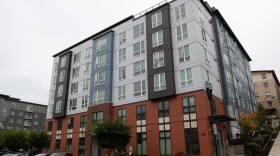Amanda Klinksiek knows that when she breaks out in hives, she likely has another problem: mold.
Hives tipped Klinksiek off to mold in a previous home. And in September, when she moved into a two-bedroom townhouse at Joint Base Lewis-McChord with her husband and two kids, the itchy red bumps appeared again.
Klinksiek, 30, tried to get the company that manages on-base housing — Liberty Military Housing — to do a comprehensive inspection for mold. She had reported mold in the toilets the day they moved in and later found mold growing under the kitchen sink. But Liberty did not respond to her repeated requests for an inspection, she said. Finally, in January, after Klinksiek paid for her own mold inspection, maintenance staff pried open a locked closet and found patches of dark mold coating the ceiling.
“I was livid,” Klinksiek said. “It was also devastating to know that I had been gaslit and misled for so long and it could have been prevented by them opening the closet to start with.”

Liberty Military Housing tried spot treating the ceiling with bleach, she said. But mold still reappears in the toilet tanks and around the fixtures in their bathtub. Klinksiek suspects it’s hidden somewhere else, too. Her hives will not go away.
Similar accounts can be heard across the Tacoma-area military base, nine families told InvestigateWest. The joint Army and Air Force base is home to more than 210,000 people, including 30,000 military members. The experiences families shared highlight the shortcomings of the military’s Tenant Bill of Rights, which Congress and the Department of Defense embraced in 2019 as a key reform after media reports revealed unsafe housing conditions on many domestic military bases.
Though the Tenant Bill of Rights set standards and outlined remedies for housing disputes, the document didn’t establish any consequences if the private companies that manage military housing fail to adhere to them. Even now, families often don’t know how to exercise their rights. Many say they keep quiet because they fear retaliation.
The weaknesses of the Tenant Bill of Rights have caught the attention of federal authorities, including the Government Accountability Office and Congress. Advocates say the Department of Defense needs to get tougher in its oversight of the companies that make billions managing housing for the nation’s military families.
“Across the board, we run into the exact same barrier over and over again with (Liberty) saying, ‘If you don’t like it, move,’” said Breanna Barnhart, an advocate with the Safe Military Housing Initiative, a nonprofit that advocates for military families, who says her own children deal with lifelong effects of lead paint and asbestos exposure from living on base at Lewis-McChord. “And they can say that because nobody within the partnership is saying, ‘No. You do not get to abuse families like that.’”
Familiar problems persist
Liberty Military Housing is one of 14 companies that contracts with the military to own and manage domestic base housing. The contracts are considered ironclad, lasting 50 years and requiring the willingness of both parties to renegotiate any terms. As a result, institutional change, however necessary, typically moves slowly.

Nevertheless, the Tenant Bill of Rights was recommended by advocates and embraced by Congress as a way to empower military families and give them remedies in case the housing companies fell short. The document spells out 18 tenant rights, including the right to review the seven-year maintenance history of a property before signing a lease, access to a dispute resolution process for persistent problems and the right to withhold rent while going through a dispute process — at least with the base commander’s approval.
Most of the housing companies agreed to implement the bill of rights in full, including Liberty. Liberty Military Housing declined an interview for this story but said in a statement that it has fully implemented all of the rights in the Bill of Rights, adding it “is fully committed to ensuring our residents live in a safe and healthy environment every day.”
At Joint Base Lewis-McChord, commanders enacted additional measures, including launching new volunteer mayor positions that could serve as advocates for residents of each of the 22 neighborhoods on base.
Residents were hopeful, but the reality has been messier, said America Lunsford, who has lived on base since 2018 and became the first mayor for her neighborhood on the base.
She heard about her neighbors’ issues with mold and rodents before she began dealing with mold and ventilation issues in her own townhome. She had also been told of Liberty technicians marking work orders resolved without doing any work. Similar conduct by another military housing contractor, which had falsified work order records, had led to criminal convictions, millions of dollars in fines and the creation of the Tenant Bill of Rights.
“I think I can stand injustice against other people less than I can stand it against myself,” Lunsford said.
Families said both Liberty and their housing office are not adhering to the spirit of the Tenant Bill of Rights in a variety of ways.

For example, the Klinksieks have the right to “reside in a housing unit … that meets applicable health and environmental standards.” But no one has followed up to check the HVAC closet where Liberty staff discovered mold, the family said, even though such follow-up inspections are recommended by both Washington state and federal agencies.
When a tree branch tore a hole into Haley Shepherd’s roof, a Liberty worker came, tarped their roof and closed their repair work order. The tarp remained there for two months, while Shepherd said she repeatedly opened work orders and saw Liberty close them, having done nothing.
Hailey Davis, who lives in a townhouse on base, immediately reported gaps and unsealed areas in the home she and her family moved into last summer, out of concern for heat efficiency and rodents. She was told the gaps were related to the foundation settling and they were not addressed.
This spring, Davis waited more than a month for Liberty’s contracted exterminator to visit, after encountering a mouse on her kitchen counter and repeatedly finding rodent droppings in their home, including in her 2-year-old daughter’s play kitchen.
“God forbid she pretended to eat it,” she said. “I asked my husband if he could go to work and talk to somebody higher up than him to see if they have any advice. I don’t even know how to talk to somebody to make it seem of more importance.”
Residents unsure where to turn
Other families also said they didn’t know how best to take their concerns to managers when they aren’t being addressed.
The Tenant Bill of Rights guarantees access to a dispute resolution process “should all other methods be exhausted.” At Lewis-McChord, those methods involve forwarding complaints to Liberty’s more senior leaders, and working with the tenant advocate in the base housing office.
If a tenant remains dissatisfied, they should approach the district manager, then the regional manager, and then the regional vice president, according to Lewis-McChord’s public affairs office.
If those efforts are ineffective, “families would contact the (base) Army Housing Office, and the Army housing office would work with (Liberty) for assistance to resolve the issue,” Joseph Piek, garrison public affairs officer at Lewis-McChord, said by email.
Several families told InvestigateWest they didn’t know about the steps Piek outlined to pursue their complaints.
“I think if people are aware of it and use it to their advantage, I can see things getting done,” Davis said. “But when people don’t have knowledge and they're clueless like me, nothing gets done for you.”
At Joint Base Lewis-McChord, families are expected to pursue all of those steps, which can take weeks, before they are able to start the dispute resolution process guaranteed in the Tenant Bill of Rights. Only then can the tenant ask for an investigation, and to have their rent withheld.

No family on the base has applied to enter the dispute resolution process outlined in the Tenant Bill of Rights, Piek said. The main reason is that Liberty’s managers are resolving tenants’ problems, he said.
During her six months as mayor, Lunsford brought the concerns of residents in her neighborhood to the base commander, Col. Philip Lamb. She asked him to put pressure on Liberty to respond more promptly to residents’ needs.
Lamb, she said, dismissed her complaints and told her to be a good team player. She resigned in response. Lamb did not respond to a request for an interview made through the public affairs office.
“I made it very clear I was not somebody who was going to feign … submissiveness,” she said.
Federal overseers dissatisfied
Members of Congress who pushed for the reforms in recent years have also recognized weaknesses.
Senators including Elizabeth Warren and Jon Osoff have pressed the Department of Defense to hold the housing companies accountable for upholding the tenants’ rights.
“Congress did not intend for military housing companies’ compliance with the tenant bill of rights and other important provisions of the 2020 (National Defense Authorization Act) to be optional,” the legislators said in a November 2022 letter. “Allowing military families’ rights to be subject to the whims of private military housing contractors creates an unacceptable level of inequity.”
Congresswoman Marilyn Strickland, whose district includes Joint Base Lewis-McChord, has advocated for better housing allowances and more resources to prevent food insecurity among military families. Her office declined a request for an interview.
Lately, Lunsford has turned to compiling written statements from residents to pass along to the Government Accountability Office. The GAO published an audit of the Tenant Bill of Rights in April and is continuing to study the effectiveness of the reform.
The audit strongly recommended expanding residents’ access to information on how to enter into the dispute resolution process. Other recommendations involved clearly identifying the roles and responsibilities of the tenant advocates, developing stronger home inspection standards and increasing training in order to reduce inconsistencies.
“By addressing these implementation weaknesses, DOD could enable personnel to more effectively perform their duties, reduce residents' confusion and frustration, and more fully meet the congressional intent of improving the privatized housing program,” the GAO stated.
Few options for families
In an area such as Tacoma, where median rent for a two-bedroom apartment is around $1,700 a month, on-base housing is typically more affordable.
That’s why, despite the mold and mice, the waiting list for on-base housing is still months long. For some neighborhoods on base, the wait is more than a year — which also puts pressure on families to accept the first house that’s made available to them, to avoid having to go back on the waiting list.
“You can’t afford to live off base, not unless you're a two-income household,” said Barnhart, the advocate with the Safe Military Housing Initiative. “And very few manage to be, because you move around so much.”
After going through the initial steps to get the housing company to respond to them, Barnhart said she sees residents often give up because so much time has gone by. Fear of retaliation, despite the bill of rights, is still strong, she said.
“That’s not the way our families should have to live,” she said.
Barnhart said she had been encouraged by some of Liberty’s actions in the immediate aftermath of the 2018 reports on poor military housing conditions. But when she began to learn more recently about what families are experiencing on base, she was dismayed.
“It seemed like all of a sudden it’s back to the good old boy system of ‘If you don’t like it, move or sue us,’” Barnhart said.
InvestigateWest (invw.org) is an independent news nonprofit dedicated to investigative journalism in the Pacific Northwest. Visit invw.org/newsletters to sign up for weekly updates.





